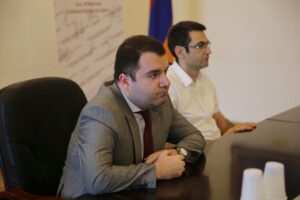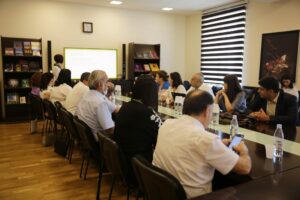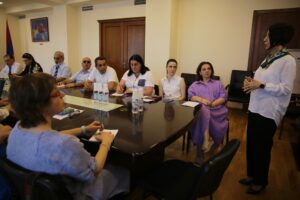Coordination meeting with MESCS Deputy Minister
June 20, 2022
 MESCS Deputy Minister Karen Trchounian launched the meeting with welcoming all participants then passed the floor to the Project Coordinator Arevik Ohanyan for update about the current state of the project implementation.
MESCS Deputy Minister Karen Trchounian launched the meeting with welcoming all participants then passed the floor to the Project Coordinator Arevik Ohanyan for update about the current state of the project implementation.
 By introducing the activities carried out within the framework of the ARMDOCT project so far, as well as the expected outcomes, Arevik Ohanyan noted that as studies show almost all third-cycle programs in Armenia are mono-disciplinary, the practice of interdisciplinary programs is not widespread, the cases of interuniversity, university-NAS institutes, university-industry collaborations are limited. Elaborating more on the planned activities, the coordinator also informed that for training and retraining purposes a study visit to University of Teramo will take place in November, which aims at studying the best practices of Italy. The administrators and scientific staff members will take part in the visit.
By introducing the activities carried out within the framework of the ARMDOCT project so far, as well as the expected outcomes, Arevik Ohanyan noted that as studies show almost all third-cycle programs in Armenia are mono-disciplinary, the practice of interdisciplinary programs is not widespread, the cases of interuniversity, university-NAS institutes, university-industry collaborations are limited. Elaborating more on the planned activities, the coordinator also informed that for training and retraining purposes a study visit to University of Teramo will take place in November, which aims at studying the best practices of Italy. The administrators and scientific staff members will take part in the visit.
Deputy Minister Karen Trchounian asked project coordinator and AM partners to take into consideration the following comments: (i) Doctoral education reforms must be paralleled with sustainable mechanisms for ensuring and monitoring the quality of the third-cycle education, including licensing requirements, to make sure that institutions meet the minimum requirements before they are granted license to operate;  (ii) The institute of supervisor must be re-established, and it should be clarified with new criteria who can supervise doctoral students’ scientific work in order to anticipate quality scientific research; (iii) Implementing inter-sectoral collaboration and long-term targeted projects between universities, research, and the industrial sector is of high priority. It is highly recommended to have at least one doctoral program in collaboration with industry, etc.
(ii) The institute of supervisor must be re-established, and it should be clarified with new criteria who can supervise doctoral students’ scientific work in order to anticipate quality scientific research; (iii) Implementing inter-sectoral collaboration and long-term targeted projects between universities, research, and the industrial sector is of high priority. It is highly recommended to have at least one doctoral program in collaboration with industry, etc.
After discussing number of issues related to the pilot implementation of newly developed legal framework and planned doctoral programs, it was agreed to pilot new models for organizing doctoral education through collaboration networks (consortia), through the formation of doctoral schools aimed at solving research, technical, or innovation problems together.
